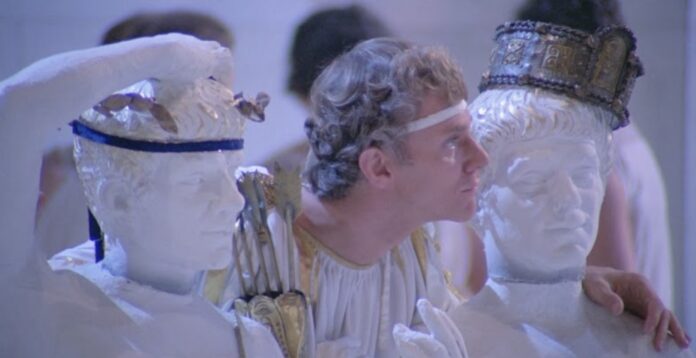
Has there ever been a time while you had been instructed or pressured to be good to one thing that didn’t deserve it? To reward one thing that, regardless of its faults, appeared to defy well mannered acknowledgment? As I grapple with discovering phrases sharp sufficient to match the depth of my emotions, I discover that the movie I want I may unsee makes a twisted form of sense. And why, one may surprise, would a distinguished actor like Peter O’Toole seem in it?
Caligula: The Final Minimize makes an attempt to resurrect a movie that has lengthy been a topic of controversy and criticism. Regardless of its lavish manufacturing values and impressive scope, the movie stays an elaborate failure, marred by a chaotic mix of historic inaccuracy, gratuitous sensationalism, and an overabundance of extra. Furthermore, it’s a tasteless movie full of specific content material that appears to use its big-name actors moderately than profiting from their skills.
Directed by Tinto Brass and produced by Bob Guccione, the movie was initially meant as a daring, provocative exploration of the notorious Roman emperor. As a substitute, it emerges as a perplexing mishmash of historic liberties and exploitative parts, extra curious about shock worth than in delivering a coherent narrative. The so-called “Final Minimize” guarantees a refined model of the movie, but it surely solely deepens the confusion and amplifies its shortcomings. But, I have to admit, typically such harshness is critical to convey the magnitude of cruelty Caligula imposed. No surprise he had so many enemies and a brief life.

The performances are equally disappointing. Whereas the solid consists of a number of achieved actors, their skills are squandered by a script that provides little depth or nuance. The dialogue typically veers into melodrama, making it troublesome for the actors to convey real emotional resonance. This leads to performances that really feel extra like caricatures than credible portrayals.
Malcolm McDowell as Caligula exemplifies the movie’s failure to steadiness historic depth with its penchant for sensationalism. Whereas McDowell’s efficiency is undeniably intense, it’s finally overshadowed by the movie’s erratic narrative and extreme content material. A extra concise method may have made a higher influence on the viewers.
Peter O’Toole, a distinguished actor, seems considerably miscast in a job that appears beneath his appreciable skills. His presence, whereas commanding, feels incongruent with the movie’s general tone and execution. Regardless of this, he delivers a efficiency that’s each terrifying and ugly in the very best sense. It’s outstanding to see the identical actor who portrayed Lawrence of Arabia, Henry II in The Lion in Winter, and Simon Dermott within the charming How one can Steal a Million with Audrey Hepburn, taking over such a job.
Visually, the movie’s opulence rapidly turns into overwhelming. The lavish units and costumes, although spectacular in scale, solely spotlight the movie’s incapability to make the most of them successfully. The cinematography, whereas sometimes putting, is commonly undermined by erratic and distracting enhancing that additional detracts from the movie’s tenuous narrative cohesion.
In the end, Caligula: The Final Minimize illustrates that capturing the uncooked and unvarnished facets of life can typically be important for delivering a profound message. The movie’s audacious method displays an try to current historical past in its most unfiltered kind, aiming to problem and provoke thought. Whereas its execution could not resonate with all viewers, it serves as a daring reminder that pushing boundaries could be a highly effective software in storytelling. Maybe, in time, audiences shall be extra receptive to such fearless portrayals, and the movie’s formidable imaginative and prescient will discover its place as a thought-provoking exploration of historic and human complexity.

